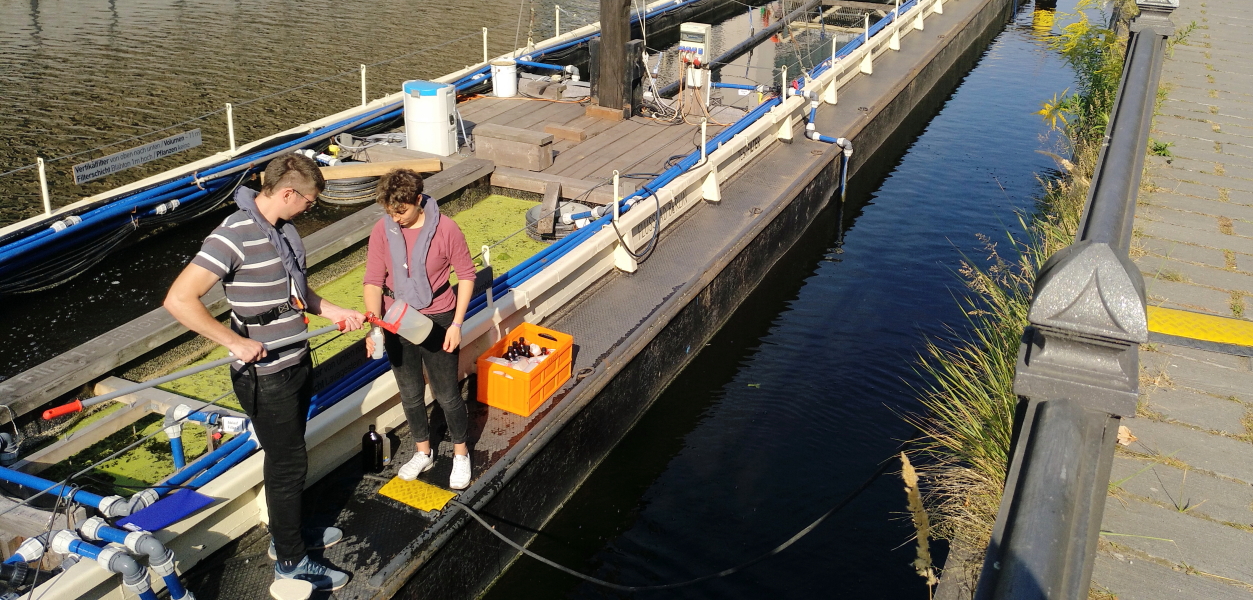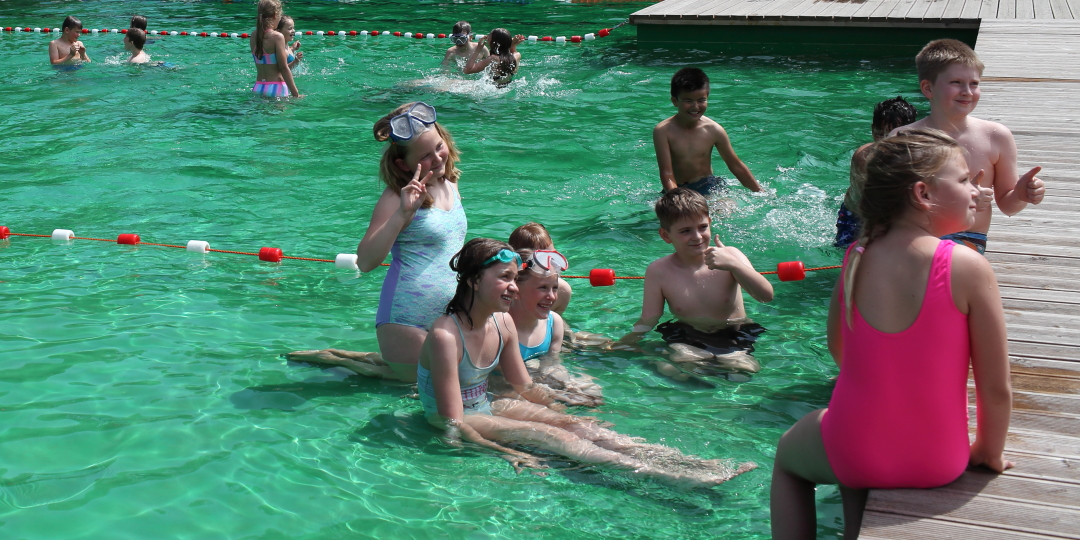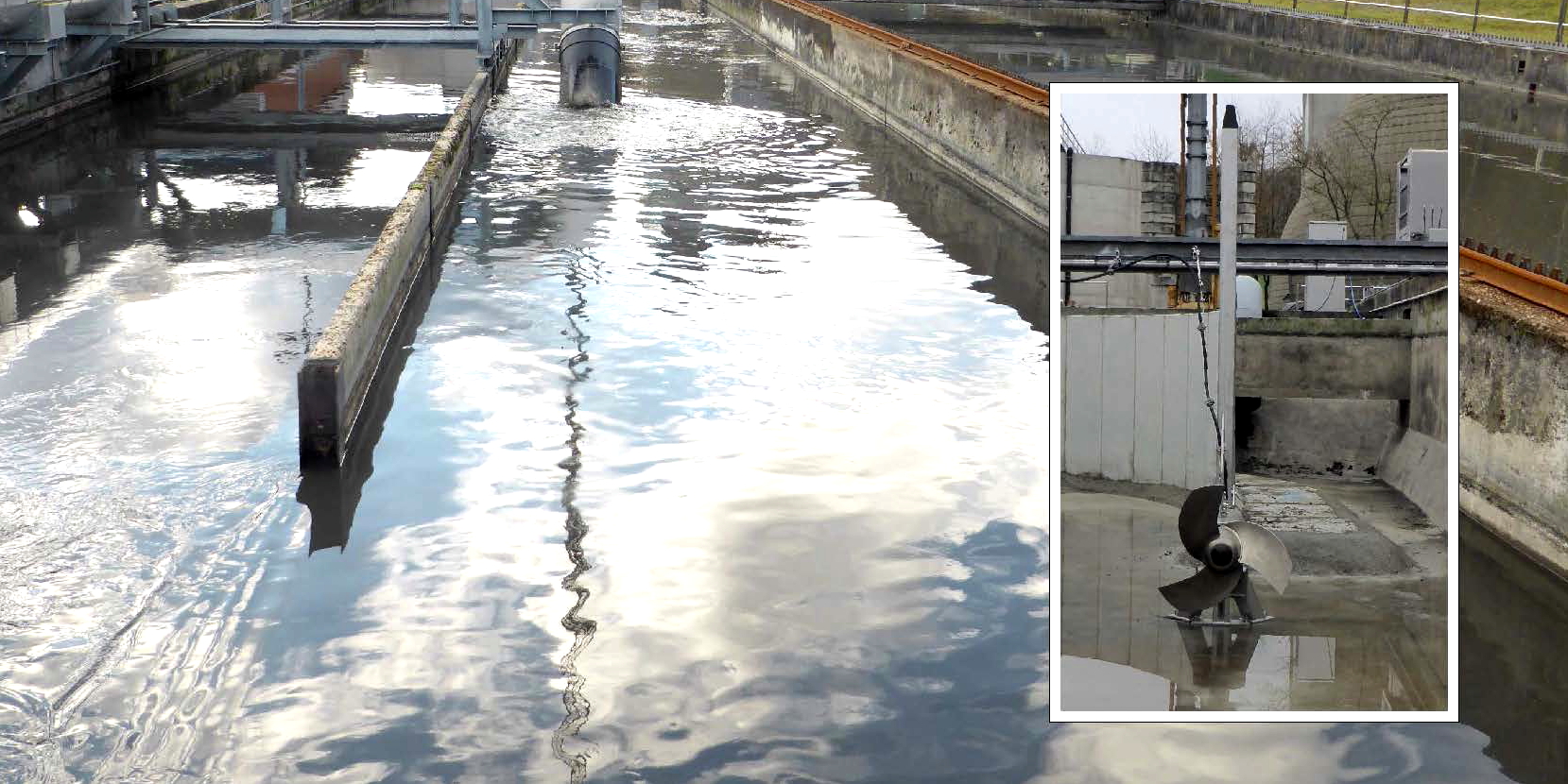

CABUWAZI climate exhibition
Public swimming pool with biofilter in Neustadt (Dosse)
River bath Berlin: Research results presented
The staff of AKUT environmental engineers spent four years in Berlin on the research barge “Hans Wilhelm” studying the treatment of water from the River Spree. Now Heribert Rustige presented the results at the press conference of the Flussbad Berlin e.V. association. The association had commissioned AKUT in 2017 to test biological filters for improving bathing water quality in the Spree Canal. For this purpose, the research barge was placed at the location of the planned water filter at the height of the former Staatsrat building in Berlin’s city centre. Here it was closely observed by numerous tourists and Berliners and the AKUT team had to answer many questions about bathing in the Spree. This report summarises the most important answers.
With the help of the water analyses, it was found that the water quality in the Spree Canal had already improved continuously during the investigation period. This is especially true for the decreasing suspended particle contents, which caused an increase in the visibility depth in the Spree Canal. This trend was confirmed in comparison with long-term data series of the Spree and suggests already successful water protection measures in the city. Against this background and due to the tested filter variants, the cleaning concept can probably be realised with a filter size reduced by 2/3.
Based on the measured, briefly increased microbial loads on a few days a year, it was possible to clearly distinguish the polluted phases due to combined sewer discharges from the unpolluted phases. This enables a targeted step-by-step treatment in a resource-saving concept. This envisages a biofilter, which is normally sufficient to guarantee good bathing water quality according to the EU Bathing Water Directive. As soon as the automatic level measurements in the sewer network of Berliner Wasserbetriebe signal the overflow of combined water, additionally switched-on UV lamps would ensure safe hygienisation. Alternatively, filter operation could then be automatically interrupted for one to two days. This would also safely protect the following watercourse section from microbial overloading.
The research results allow the planning and dimensioning of biofilters for river water treatment. Five different filter materials with or without vegetation were examined. The elimination rates of E. coli and other indicator organisms were determined on the basis of loading tests. The best combination was found to be the use of porous expanded clay with reed planting. The results are an important addition to the know-how available so far, also for outdoor pools with biological water treatment. Experiences and technical innovations made here can be transferred to other water bodies and locations or enable targeted further investigations. We would like to thank the sponsors Xylem (UV -reactor), Rehau (drainage system) and ARGEX Belgium (expanded clay material) for their technical support.
Contact: Heribert Rustige

River bath Berlin: Research results presented
"Am Palmsberg" WWTP (40,000 p.e.) Denitrification stage optimized and energy saved
Public swimming pool with biofilter in Neustadt (Dosse)
In bright weather, on the first day of loosening the Covid-19 lockdown in Brandenburg, Mayor Karl Tedsen and District Director Dieter Fuchs together with Katrin Covic, head of the citizens association Aktives Neustadt, opened the newly designed outdoor swimming pool in Neustadt an der Dosse on June 3, 2021. For nine years, citizens had to wait for the renovation of the old dilapidated swimming pool. Today, a biological filter replaces the water treatment that used to be operated with chlorine chemistry.
During the fundamental renovation, a diving facility with a 1-meter board and 3-meter tower was added to the pool. This resulted in an elaborate extension and redesign of the old concrete pool. The lining of the approximately 540 square meter pool with a high-quality PVC-free foil as well as the access via a natural wooden walkway now convey a warm and natural impression. The shallow access via the non-swimmer area is based on natural shallow banks, is barrier-free and invites the little ones to splash around.
The biological water treatment system consists of a simple soil filter located away from the bathing area. The substrate provides a large surface area for microorganisms to grow. Their task here is to break down organic pollutants, which can be carried in by bathers but also by the adjacent vegetation or birds. The advantages of this natural process lie in its adaptive properties and the avoidance of chlorine-organic compounds that would otherwise be produced during chlorination. This means that the biofilm grows with its tasks: if the food supply in the biofilter increases, the biomass grows and increases the purification capacity. However, natural systems are comparatively sluggish, so a training period is required.
The focus of natural bathing water treatment is on the reduction of germs and phosphate. While undesirable bacteria are preyed by the protozoa on the biofilm, phosphorus can only be adsorptively bound to the filter material. For this purpose, the biofilter was supplemented by a regenerable phosphate filter, because the more phosphate is bound there, the clearer the water in the bathing pond remains.
With this solution, the city of Neustadt (Dosse) opted for a cautious renovation of the public swimming pool, taking into account the existing building fabric. The regional planning offices s quadrat m, freelance architects Sylvia Markau and Steffen Michaelis from Kyritz and VORLAND, landscape and open space planning Susanne Geitz from Wulkow were entrusted with this task in conjunction with the specialist planning office for ecological water treatment AKUT Umweltschutz Ingenieure Burkard und Partner, Heribert Rustige.
Contact: Heribert Rustige

Public swimming pool with biofilter in Neustadt (Dosse)
International Covid-19 dialogs held with WSSPs
"Am Palmsberg" WWTP (40,000 p.e.) Denitrification stage optimized and energy saved
The Abwasserverband Saale-Lauer, operator of the wastewater treatment plant built in the late 1970s (city of Bad Neustadt an der Saale, Lower Franconia), is optimizing the wastewater treatment plant and adapting it to the stricter environmental requirements. Priority has been also given to the stability of the cleaning performance and energy efficiency.
AKUT was commissioned in 2018 to identify expansion and optimization options for the wastewater treatment plant. Several modules were developed, of which the fluidic optimization of the denitrification basin was practically and successfully completed at the end of 2020.
Among other measures, the inlet and the circulation of the denitrification stage had to be hydraulically optimized. In the medium term, an expansion of the treatment plant is also planned, which is increasingly reaching its loading limits. Reconstructions from previous years were subjected to a weak-point analysis, which aimed at stabilizing the effluent quality and achieving a more energy-efficient operation.
The denitrification stage was found to operate below optimum cleaning performance. The cause was identified as inadequate hydraulics in the inlet area. Furthermore, sludge accumulation occurred in the basin due to unfavourable flow guidance and non-optimal agitators.
In 2020, the closure of the old distribution channel and the adaptation of the threshold structures were implemented in accordance with the hydraulic calculation carried out by AKUT, so that the entire water flow and the entire return sludge is now routed through the denitrification stage.
In order to improve the circulation behaviour of the wastewater and to avoid the previously observed sludge deposits on the basin bottom in the future, concrete elements calculated and manufactured for the application were embedded in the longitudinally divided structure and the existing corners in the basin were optimally designed.
The newly installed, slow-running propeller agitator, the thrust of which is adapted to the different recirculation and sludge return feeds as required, results in energy savings of 50% compared with the previous agitators.